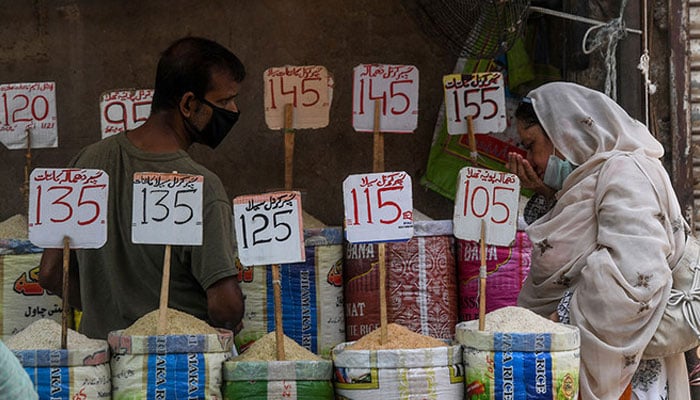Low inflation brings relief but poses revenue challenges for FBR
LAHORE: Extremely low inflation can have both positive and negative implications for Pakistan’s economy, depending on the broader economic context and the government’s response.
The benefits of low inflation for Pakistan include stability in consumers’ purchasing power, as it preserves the real value of income -- making essentials such as food, transport and energy more affordable. This is particularly crucial in a country where many people live on fixed or low incomes. It also provides the State Bank of Pakistan (SBP) with the flexibility to lower interest rates to support economic growth, especially during slowdowns.
Low inflation contributes to currency stability and investor confidence, potentially attracting foreign investment and helping to stabilise the external account. This macroeconomic stability is vital for Pakistan’s long-term growth.
However, there are also several risks associated with prolonged or extremely low inflation. It poses revenue challenges for the Federal Board of Revenue (FBR), which collects taxes based on nominal values. If prices stagnate, sales tax revenues -- being ad valorem -- grow slowly. Similarly, income tax from businesses may stagnate if profits do not increase, and customs duties can decline due to lower import values.
Businesses may also find it difficult to raise prices, limiting wage growth and profit margins. This can discourage investment and expansion. Moreover, if inflation remains low while interest rates stay high due to fiscal concerns, the real cost of borrowing becomes burdensome for both the government and the private sector.
A key driver of Pakistan’s current low inflation is the decline in global prices for oil, food, and other commodities -- particularly significant in the oil and gas sector, as the country imports most of its energy needs. Lower global oil prices reduce fuel, electricity, and transport costs, leading to broader price stability. Softer global food prices and domestic agricultural surpluses have also helped contain food inflation, a major component of Pakistan’s Consumer Price Index (CPI).
Despite this relief, low inflation coupled with ambitious revenue targets creates significant challenges for the FBR. To meet its targets without relying on inflation-driven gains, the FBR must focus on structural reforms and widening the tax base. This will require bringing the large informal sector into the documented economy. Measures include enforcing point-of-sale (POS) systems in retail and linking wholesalers to digital platforms.
Efforts must also be made to digitise supply chains, especially in sectors such as textiles, electronics and restaurants. Combating smuggling and under-invoicing will become increasingly important, requiring better border controls and greater customs transparency. The FBR must integrate data from ports, shipping lines, and customs declarations to improve enforcement.
Above all, greater revenue could be generated if the government improves property and agriculture taxation. Property valuations need to be rationalised to reflect market levels. Large agricultural landholders -- currently mostly exempt -- should be taxed more effectively. Furthermore, taxpayer compliance can be enhanced through the use of Nadra, utility bills, and banking data to identify non-filers.
The government and the FBR must also leverage technology by using artificial intelligence and big data to flag under-reported incomes. Expanding mobile-based tax payment systems for SMEs and freelancers would further improve collection efforts.
While low inflation supports macroeconomic stability and provides relief to consumers, especially when driven by benign factors like declining oil and food prices, it also hinders revenue collection in nominal terms. The FBR must respond with stronger enforcement, better documentation, and increased use of technology to maintain or grow revenues in a low-inflation environment.
-
 Chyler Leigh Pays Moving Homage To 'Grey’s Anatomy' Co-star Eric Dane: 'He Was Amazing'
Chyler Leigh Pays Moving Homage To 'Grey’s Anatomy' Co-star Eric Dane: 'He Was Amazing' -
 Did You Know Tech CEOs Limit Screen Time For Their Own Kids?
Did You Know Tech CEOs Limit Screen Time For Their Own Kids? -
 Matthew Lillard Admits Fashion Trends Are Not His 'forte'
Matthew Lillard Admits Fashion Trends Are Not His 'forte' -
 SpaceX Launches Another Batch Of Satellites From Cape Canaveral During Late-night Mission On Saturday
SpaceX Launches Another Batch Of Satellites From Cape Canaveral During Late-night Mission On Saturday -
 Princess Beatrice, Eugenie Get Pulled Into Parents’ Epstein Row: ‘At Least Stop Clinging!’
Princess Beatrice, Eugenie Get Pulled Into Parents’ Epstein Row: ‘At Least Stop Clinging!’ -
 Inside Kim Kardashian's Brain Aneurysm Diagnosis
Inside Kim Kardashian's Brain Aneurysm Diagnosis -
 Farmers Turn Down Millions As AI Data Centres Target Rural Land
Farmers Turn Down Millions As AI Data Centres Target Rural Land -
 Trump Announces A Rise In Global Tariffs To 15% In Response To Court Ruling, As Trade Tensions Intensify
Trump Announces A Rise In Global Tariffs To 15% In Response To Court Ruling, As Trade Tensions Intensify -
 Chappell Roan Explains Fame's Effect On Mental Health: 'I Might Quit'
Chappell Roan Explains Fame's Effect On Mental Health: 'I Might Quit' -
 AI Processes Medical Data Faster Than Human Teams, Research Finds
AI Processes Medical Data Faster Than Human Teams, Research Finds -
 Sarah Ferguson’s Friend Exposes How She’s Been Since Andrew Mountbatten-Windsor’s Release
Sarah Ferguson’s Friend Exposes How She’s Been Since Andrew Mountbatten-Windsor’s Release -
 Jelly Roll Explains Living With 'severe Depression'
Jelly Roll Explains Living With 'severe Depression' -
 Charli XCX Applauds Dave Grohl’s 'abstract' Spin On Viral ‘Apple’ Dance
Charli XCX Applauds Dave Grohl’s 'abstract' Spin On Viral ‘Apple’ Dance -
 Anna Sawai Opens Up On Portraying Yoko Ono In Beatles Film Series
Anna Sawai Opens Up On Portraying Yoko Ono In Beatles Film Series -
 Eric Dane's Wife Rebecca Gayheart Shares Family Memories Of Late Actor After ALS Death
Eric Dane's Wife Rebecca Gayheart Shares Family Memories Of Late Actor After ALS Death -
 Palace Wants To ‘draw A Line’ Under Andrew Issue: ‘Tried And Convicted’
Palace Wants To ‘draw A Line’ Under Andrew Issue: ‘Tried And Convicted’




